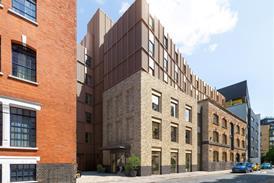- Home
 Heatherwick unveils designs for first residential project in South Korea
Heatherwick unveils designs for first residential project in South Korea Architecture practices monitoring Middle East teams as Iran conflict escalates
Architecture practices monitoring Middle East teams as Iran conflict escalates Green light for Ackroyd Lowrie’s co-living redesign of SPPARC office scheme in Bermondsey
Green light for Ackroyd Lowrie’s co-living redesign of SPPARC office scheme in Bermondsey Reuse of historic buildings dominates 2026 RIAS Awards shortlist
Reuse of historic buildings dominates 2026 RIAS Awards shortlist
- Intelligence for Architects
- Subscribe
- Jobs
- Events

Events calendar Explore now 
Keep up to date
Find out more
- Programmes
- CPD
- More from navigation items
Government deregulation and cuts ‘hobbled’ fire safety group, Grenfell Inquiry hears

BRE taskforce was given ‘contractual requirement’ to rubber-stamp flawed regulations
The government “hobbled” a group of fire safety experts appointed to spot flaws in building regulations because of a culture of deregulation, the Grenfell Inquiry has heard.
Ministers gave the Building Research Establishment (BRE) “investigation of real fires project” a “contractual requirement” not to make any policy recommendations.
David Crowder, former head of fire investigation at the BRE, told Wednesday’s hearing that the group’s reports were limited to pointing out “implications” raised by building fires.
…
This content is available to registered users | Already registered?Login here
You are not currently logged in.
To continue reading this story, sign up for free guest access
Existing Subscriber? LOGIN
REGISTER for free access on selected stories and sign up for email alerts. You get:
- Up to the minute architecture news from around the UK
- Breaking, daily and weekly e-newsletters
Subscribe to Building Design and you will benefit from:

- Unlimited news
- Reviews of the latest buildings from all corners of the world
- Technical studies
- Full access to all our online archives
- PLUS you will receive a digital copy of WA100 worth over £45
Subscribe now for unlimited access.


